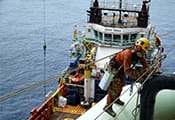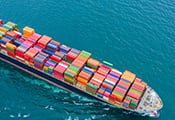Marine Shipping
Marine shipping helps transfer goods from one place to another by water. It is a type of contract wherein the owner of the ship agrees to carry the specified goods of the other entity to the said destination by way of water. This service is provided in return for the premium paid under the marine insurance policy.
Being one of the oldest modes of transportation, it’s also one of the most available modes as water occupies most of our planet. Even with alternative options, like air, rail and road transportation, marine shipping is still considered one of the most efficient modes.
Learn more about Marine Insurance
Marine Shipping Advantages
For anyone involved in the shipping business internationally, it is well known that marine shipping is highly feasible from a price point of view. It has various advantages, but the most important is its low cost and flexibility.
- Highly Economical: Without a second thought, marine shipping offers the most competitive freight costs, especially for long distances. As compared to air transport, it is more cost-effective. In fact, air transport prices are usually 4-6 times higher than ocean shipping.
- Offers Heavy, Oversized and Spacious Vessels: Irrespective of the size of the shipment, shipping companies accommodate your needs. If the shipment is smaller, they can be grouped on a sharing basis and more cost-effective transportation. If the containers are huge or oversized, they can be transported on a special ship if required.
- Safety: Ships are specially designed to carry hazardous materials safely. The maritime industry is well-versed in handling hazardous materials, and thus all safety standards are met. All the regulations are followed to ensure the safety of the crew, cargo, vessel and the environment. Additionally, marine shipping involves lower energy consumption.
- Environmental Friendliness: As per the OECD and the International Transport Forum Report, shipping accounts for 2.6% of the total greenhouse emission. However, this is lower than air and other modes of transportation, which have relatively high carbon footprints. Marine shipping is thus one of the least environmentally damaging modes of transport. Also, during the last 15 years, marine pollutants have drastically reduced, especially in the quantity of oil spilled into the sea.
Marine Insurance Necessity
The transportation of goods can be risky, especially if it is done by sea. This is because this mode of transportation is highly subject to man-made and natural situations. Marine insurance covers the damage to ships, and cargo, incurred during transportation.
A marine insurance policy can help cover the risks faced by various intermediaries in the shipping business like the ship owners, cargo owners or terminal handlers for efficient ocean shipping.
A cargo insurance policy can be broadly divided based on the types of coverage and structure of the plan. Out of the policies based on the plan's structure, the most common type is the Marine Open Policy. A marine open policy is also sometimes called a floating policy, and it provides coverage for multiple numbers of transit journeys during the policy term.
Final Words
Shipping is the life force of the global economy. Without marine shipping, international trade, transporting raw materials in bulk, and importing and exporting various goods would not have been possible. With the increase in maritime trade volumes, its efficiency is kept intact due to the advantages this mode offers and the level of safety and sustainable growth it provides to parties involved.





































 Expert advice made easy
Expert advice made easy


